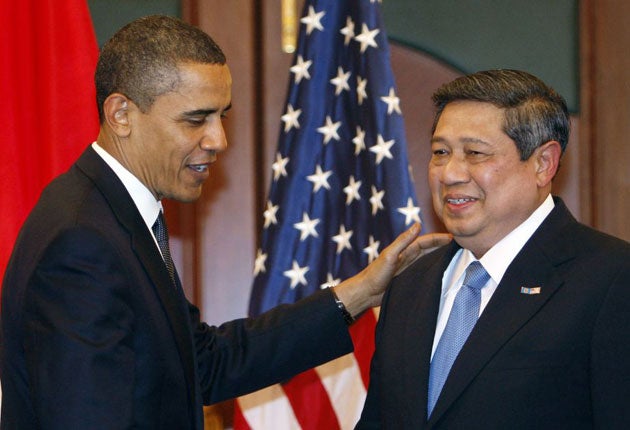Chinese taunt Obama with Tibet 'slavery'
US President must soothe prickly hosts while talking tough on the economy

Your support helps us to tell the story
This election is still a dead heat, according to most polls. In a fight with such wafer-thin margins, we need reporters on the ground talking to the people Trump and Harris are courting. Your support allows us to keep sending journalists to the story.
The Independent is trusted by 27 million Americans from across the entire political spectrum every month. Unlike many other quality news outlets, we choose not to lock you out of our reporting and analysis with paywalls. But quality journalism must still be paid for.
Help us keep bring these critical stories to light. Your support makes all the difference.
As US President Barack Obama arrived in Shanghai last night, on his first visit to China, his celebrated eloquence is set to get a major work-out as he tries to balance the need to underline strong Sino-US ties with the need to emphasise Washington's global role in the face of growing Chinese economic muscle.
Climate change, trade and the value of the Chinese currency will feature on the agenda during the visit. The President will try to avoid confrontation while he is in the country that is, from a strategic point of view, probably the most important stopping-point on his nine-day Asian tour .
Mr Obama got a taste of the tone of his hosts' arguments on the Tibet question even before he had touched down yesterday. A Foreign Ministry spokesman, Qin Gang, made the remarkable argument that Mr Obama should be especially sympathetic to China's opposition to the Dalai Lama because he is a black President who has lauded Abraham Lincoln for helping abolish slavery.
"He is a black President, and he understands the slavery abolition movement and Lincoln's major significance for that movement," Qin Gang said. "Lincoln played an incomparable role in protecting the national unity and territorial integrity of the United States." The implication was that the Dalai Lama and his fellow members of the Tibetan monastic hierarchy had, prior to their going into exile, been slave-masters.
The allegation drew a furious rebuff from the Free Tibet Campaign. "It is an insult for the unelected and authoritarian Chinese government to suggest that an instinctive democrat such as Abraham Lincoln would have sided with China in seeking to deny the Tibetan people their fundamental right to determine their own future, " said the group's Stephanie Brigden.
But China's status as the largest foreign lender to the US means Mr Obama must tread warily, especially as the rising superpower is expected to become the world's second largest economy next year. Washington and Beijing have already had a row over exchange rates at the summit of the Asia Pacific Economic Cooperation forum in Singapore at the weekend.
A reference to "market-oriented exchange rates" was cut from the communique issued at the end of two days of talks, because the two sides could not agree on the wording.
The White House has already said Mr Obama will raise the difficult issue of whether China's yuan currency is undervalued, and other trade issues. For Americans, as for many countries in the region, the continuing low value of the Chinese yuan is a major irritant in terms of competitiveness.
Since Mr Obama announced special duties of 35 per cent on Chinese-made tyre imports in September, there have been trade tensions in various other sectors also. Meanwhile Chinese officials point out that as joblessness remains high in the United States, protectionist pressures are likely to continue to influence American policy,
Despite these tensions, Mr Obama will try to enlist Beijing's help on global economic recovery, and on burning security issues such as deflating North Korea's nuclear ambitions, and also on dealing with Iran. "The United States does not seek to contain China," he said yesterday. "On the contrary, the rise of a strong, prosperous China can be a source of strength for the community of nations."
He went on, "I see China as a vital partner, as well as a competitor... Together we are encouraging responsible behaviour around the world."
Subscribe to Independent Premium to bookmark this article
Want to bookmark your favourite articles and stories to read or reference later? Start your Independent Premium subscription today.
Join our commenting forum
Join thought-provoking conversations, follow other Independent readers and see their replies
Comments